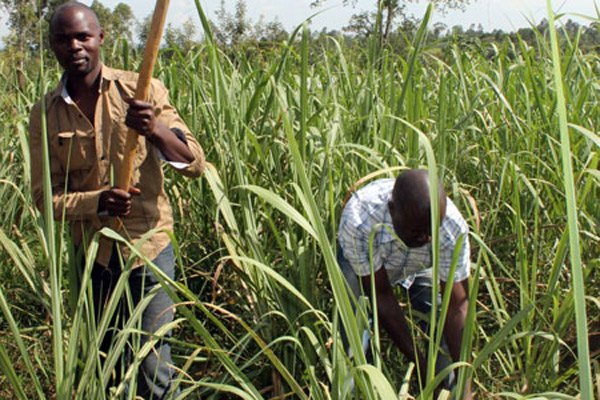The National Sugar Task Force yesterday announced plans to pay Sh2.7bn dues owed to sugarcane farmers since 2014 after the government completed auditing of genuine beneficiaries.
Data from the Ministry of Agriculture reveal that farmers who supplied cane to Mumias Sugar Company are owed Sh889m, Sony Sugar Sh512m, Muhoroni-Miwani Sh474m, Chemelil Sugar Sh201m and Nzoia Sh524m since 2014.
Delay in paying cane farmers over the last five years has led to drop in production of sugarcane.
In 2017 for instance, the quantity of sugarcane delivered to factories by smallholder farmers in the country reduced from 7.2m tonnes in 2016 to 4.8m tonnes, representing 33.3 per cent shrinkage according to the 2018 Economic Survey Report. This was on account of prolonged drought unfavorable to cane growth that led to harvesting of immature plants.
The report reveals that total area under sugarcane decreased to 191,200 in ha in 2017 compared to 220,800 ha recorded in 2016. The reduction in the area under the cane was attributed to conversion of land under the crop to other crops such as maize, soya beans, cassava and sorghum.
Related content
Kakamega farmer earns big from pig rearing after abandoning cane and maize farming
Kakamega dairy law to relieve farmers from over-reliance on sugarcane farming
Bio fertilizer doubles cane yields

The average sugar yield per ha also reduced from 55.3 tonnes in 2017 from 62.2 tonnes in 2016, a 10.9 per cent cut.
To curb the shortage, Kenya imported 989.6 thousand tonnes with most of the imports (83.1 per cent) being consumed directly.
Daniel Mumia, 24, a farmer in Kakamega County does not regret quitting sugarcane growing to focus on groundnut and Bambara nuts farming, a venture that is now earning him steady triple income.
The farmer now earns approximately Sh752,000 per season from nut farming compared to Sh240,000 he used to take home from sugarcane farming.
“I quit sugarcane farming two years ago due to delayed payments for cane delivered to Mumias Sugar Company which owes me Sh240,000 for 80 tonnes of produce,” said Mumia.
“I decided to grow groundnut and Bambara nut farming by expanding the in initial two acre farm into a six acre farm which was previously occupied by sugarcane. The land was acquired from my father,” said Mumia.
In a season, the farmer harvests approximately 16 unshelled bags of groundnuts and up to 35 bags of Bambara nuts.
Once shelled the groundnuts reduce in volume to four bags which he sells at Sh13,000 per bag while Bambara nuts retails at Sh250 per kilo translating to Sh22,500 per 90kg bag at Matungu market.
















Comments powered by CComment